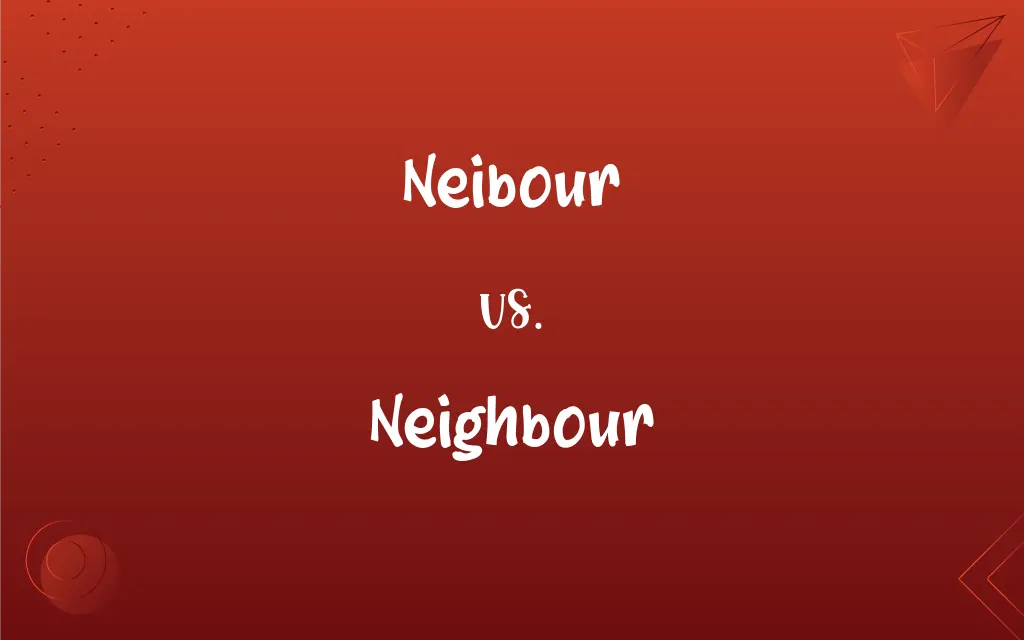Neibour vs. Neighbour: Mastering the Correct Spelling
Edited by Aimie Carlson || By Harlon Moss || Published on March 7, 2024
"Neibour" is a misspelling of "neighbour," which correctly refers to a person living nearby or adjacent to another.

Which is correct: Neibour or Neighbour
How to spell Neighbour?

Neibour is Incorrect

Neighbour is Correct
ADVERTISEMENT
Key Differences
Associate "neighbour" with "our home," indicating closeness and community.
"Neighbour" rhymes with "labour," both sharing the '-our' ending in British English.
Remember, Americans drop the 'u' (neighbor), but the British keep it (neighbour).
"Neighbour" has three vowels (e-i-ou), aligning with the three syllables in the word.
In "neighbour," 'g' comes before 'h' just like in the alphabet.
ADVERTISEMENT
Correct usage of Neighbour
My neibour is very friendly and always says hello.
My neighbour is very friendly and always says hello.
He borrowed a ladder from his neibour.
He borrowed a ladder from his neighbour.
Neighbour Definitions
A neighbour is someone who lives very close, often in the adjacent house or apartment.
She borrowed a cup of sugar from her neighbour.
In a community or group, a neighbour refers to fellow members or participants.
At the meeting, he sat next to his neighbour from the committee.
In mathematics or science, it can refer to an element closely related or adjacent to another.
In the sequence, each number is the neighbour of the preceding one.
Neighbour can refer to a country, region, or area adjacent to another.
Canada is a neighbour to the United States.
Metaphorically, a neighbour signifies someone who offers help or support.
In times of crisis, everyone should act as a good neighbour.
Variant of neighbor.
A person living on adjacent or nearby land; a person situated adjacently or nearby; anything (of the same type of thing as the subject) in an adjacent or nearby position.
My neighbour has two noisy cats.
They′re our neighbours across the street.
One who is near in sympathy or confidence.
Neighbour Sentences
I borrowed a cup of sugar from my neighbour.
The children from next door neighbour are always playing outside.
The neighbour across the street has a new car.
Our neighbour has a dog that barks a lot.
Our neighbour helped us move in when we first arrived.
It's nice having a neighbour who is also a good friend.
My neighbour offered to lend me his lawn mower.
They asked their neighbour to watch their house while they were away.
Our neighbour is always willing to help with gardening tips.
My neighbour and I share a love for vintage movies.
I received a lovely housewarming gift from my neighbour.
Neighbour Idioms & Phrases
Love thy neighbour
Treat others with kindness and respect.
She embodies the principle of love thy neighbour by always helping those around her.
Next-door neighbour
The person living in the house or apartment immediately next to one's own.
My next-door neighbour and I take turns mowing the lawn between our houses.
Be a good neighbour
To be considerate and helpful towards those living near you.
He always makes an effort to be a good neighbour by keeping noise to a minimum.
Borrow a cup of sugar from a neighbour
Depending on neighbours for small acts of kindness.
When she ran out of sugar while baking, she knew she could always borrow a cup of sugar from a neighbour.
Neighbour disputes
Conflicts or disagreements between neighbours.
They resolved their neighbour disputes with a friendly conversation instead of letting the issues escalate.
Ask a neighbour for help
Seeking assistance from someone living nearby.
When her car wouldn't start, she didn't hesitate to ask a neighbour for help.
FAQs
Why is it called neighbour?
It's called "neighbour" from the Old English "neahgebur," where "neah" means "nigh" and "gebur" means "dweller."
Which vowel is used before neighbour?
The vowel "a" is often used before "neighbour," as in "a neighbour."
What is the verb form of neighbour?
The verb form is "to neighbour," meaning to be situated next to or very near.
What is the pronunciation of neighbour?
It's pronounced as /ˈneɪ.bɚ/ in American English.
What is the root word of neighbour?
The root word is the Old English "neahgebur" ("neah" + "gebur").
Which preposition is used with neighbour?
Common prepositions include "to," "of," and "with" (e.g., neighbour to, neighbour of, good with neighbours).
What is the plural form of neighbour?
The plural form is "neighbours."
Which conjunction is used with neighbour?
Common conjunctions can include "and" or "or" (e.g., neighbour and friend, neighbour or stranger).
What is the singular form of neighbour?
The singular form is "neighbour."
Is neighbour a noun or adjective?
Neighbour is primarily a noun but can function as an adjective in compound nouns (e.g., neighbour dispute).
Is neighbour an abstract noun?
No, it's a concrete noun, referring to a specific person or entity.
Which article is used with neighbour?
The indefinite article "a" or the definite article "the" can be used (e.g., a neighbour, the neighbour).
How is neighbour used in a sentence?
"She went next door to chat with her neighbour about the community event."
Is neighbour a countable noun?
Yes, you can have one or many neighbours, making it countable.
Is the neighbour term a metaphor?
It can be used metaphorically to denote closeness or community.
Is neighbour a vowel or consonant?
The word "neighbour" starts with a consonant.
Is the word neighbour imperative?
No, it's not an imperative; it's a noun or adjective.
How many syllables are in neighbour?
There are two syllables: neigh-bour.
How do we divide neighbour into syllables?
It's divided as neigh-bour.
What is a stressed syllable in neighbour?
The first syllable is stressed: NEIGH-bour.
Which determiner is used with neighbour?
Determiners like "the," "my," "your," or "a" can be used (e.g., the neighbour, my neighbour).
What is the second form of neighbour?
There's no second form; it's not a verb. As a noun, it stays "neighbour."
What is the third form of neighbour?
Similarly, there's no third form; as a noun, it remains "neighbour."
What part of speech is neighbour?
Neighbour is primarily a noun but can be used adjectivally.
What is another term for neighbour?
Alternate terms include adjacent, nearby resident, or local.
What is the first form of neighbour?
The first (base) form is "neighbour."
What is the opposite of neighbour?
The opposite could be stranger or non-resident.
Is neighbour an adverb?
No, neighbour is not an adverb.
Is neighbour a negative or positive word?
It's neutral, but context can make it positive (good neighbour) or negative (nosy neighbour).
Is neighbour a collective noun?
No, it's not typically used as a collective noun.
About Author
Written by
Harlon MossHarlon is a seasoned quality moderator and accomplished content writer for Difference Wiki. An alumnus of the prestigious University of California, he earned his degree in Computer Science. Leveraging his academic background, Harlon brings a meticulous and informed perspective to his work, ensuring content accuracy and excellence.
Edited by
Aimie CarlsonAimie Carlson, holding a master's degree in English literature, is a fervent English language enthusiast. She lends her writing talents to Difference Wiki, a prominent website that specializes in comparisons, offering readers insightful analyses that both captivate and inform.

































































